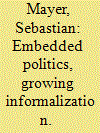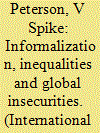| Srl | Item |
| 1 |
ID:
106769


|
|
|
|
|
| Publication |
2011.
|
| Summary/Abstract |
This article investigates changes in the ways NATO and EU states have pursued security since the end of the Cold War, and the repercussions for the state monopoly of external force. Both organizations have autonomous roles, security identities and norm-shaping abilities, making them more consequential than is often acknowledged. Using the analytical concept of internationalization - the increasing importance of political or administrative authorities beyond the nation-state - this article scrutinizes the institutionalization of new functions, mechanisms and operational roles within NATO and the EU's Common Foreign and Security Policy. The resulting process of internationalization can be labelled embedded security politics, a political order characterized by fragmented responsibilities in which underlying national preferences are altered by transgovernmental and transnational contacts and pressure to reach consensus, by thicker institutional structures of rules and common practices that constrain national decision-making, and by schemes that subject national capabilities for autonomous action to institutional and physical constraints. The desirable degree of internationalization is still contested among capitals. There are also unspecific signs of an informalization of decision-shaping or -making: governments use ad hoc networks outside the treaty-based international organizations, allowing more freedom with regard to the interpretation of institutional obligations. The article concludes that internationalization and informalization have more in common than is often admitted, with fundamental implications for the future of national action and security cooperation.
|
|
|
|
|
|
|
|
|
|
|
|
|
|
|
|
| 2 |
ID:
096573


|
|
|
|
|
| Publication |
2010.
|
| Summary/Abstract |
Global restructuring has dramatically affected the value, extent, and significance of informal economic activities worldwide. Approaching informalization as a systemic phenomenon, this essay illuminates linkages among economic processes, widening inequalities, "governance gaps," and global insecurities. It considers the historical context in which distinctive approaches to informality emerged and reviews three principal "islands" of existing research: mainstream, structuralist, and feminist. These variously illuminate patterns of economic inequality that are central to studies of international political economy. Informality's significance to IR and security studies is further illuminated through a discussion of the processes and political economy of informalization in relation to global migrations, and the interaction of economic and political informalization in the context of "new" wars and security crises.
|
|
|
|
|
|
|
|
|
|
|
|
|
|
|
|